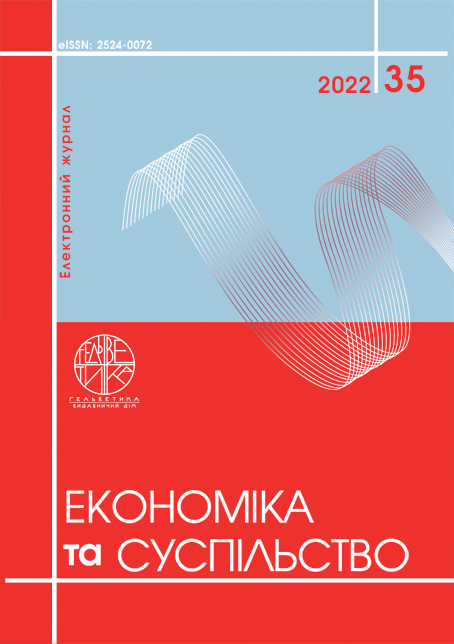ORGANIZATION AND MANAGEMENT OF BUSINESS UNDER THE CONDITIONS OF RATIONAL USE OF TIME OF THE ENTERPRISE’S MANAGER
Abstract
It is established that the productivity of the manager of any level depends on the rational distribution of working and leisure time. The main reasons for inefficient use of working time by manager and personnel management of the enterprise are identified, in particular: insufficient level of qualification, lack of practical experience, inability to use planning tools, lack of strategic thinking and vision, inability to divide cases into primary and secondary responsibilities, disorganized business processes, underdeveloped process of information exchange in the organization, unclear formulation of tasks and end results, lack of resources to perform the task, lack of proper coordination of employees, lack of division of labor according to their importance, low motivation, increased workload in the absence of incentives for performers, a large number of meetings and gatherings, low level of automation and digitalization of enterprise processes, distraction on social networks. Objective factors of time shortage are singled out such as: a large flow of routine cases, unforeseen cases, work with correspondence, the emergence of urgent cases. The negative consequences of inefficient use of working time are outlined. The tools to eliminate time wasters are developed and proposed, namely: mandatory planning of cases and time required for their implementation, determining the time reserve for unforeseen events, prioritization of criteria such as urgency and importance of the case, the use of delegation, control performance and monitoring, self-discipline and self-development, self-management. It is established that for the effective use of the law of time in the enterprise, time must be properly "organized" at all levels: personal, team, corporate. Time management strategies in the organization are improved. It is also determined that time management mostly consists in the correct organization of activities, i.e. it is necessary not to manage time, but to manage oneself. The model of the organization of activity of the head is developed. The basic measures concerning the organization of activity of the head for the purpose of rational use of time are offered.
References
Данюк В.М. Організація праці менеджера : навч. посіб. Київ : КНЕУ, 2006. 276 с.
Крикун О. Ключові моменти тайм-менеджменту для досягнення успіху в бізнесі. Галицький економічний вісник. 2019. № 4 (59). URL: http://elartu.tntu.edu.ua/handle/lib/29524 (дата звернення: 12.12.2021).
Писаревська Г.І. Використання тайм-менеджменту для підвищення ефективності управління персоналом. Науковий вісник Херсонського державного університету. Серія «Економічні науки». 2016. Вип. 20. Ч. 1. С. 148–153. URL: http://nbuv.gov.ua/UJRN/Nvkhdu_en_2016_20%281%29__38 (дата звернення: 27.12.2021).
Приходченко Л.Л., Панченко Г.О., Піроженко Н.В., Оганісян М.С. Управління людськими ресурсами : конспект лекцій. Одеса : ОРІДУ НАДУ, 2018. 207 с.
Тайм-менеджмент – технологія підвищення ефективності використання часу. URL: http://market.avianua.com/?p=4069 (дата звернення: 03.12.2021).
Холодницька А.В. Застосування технологій тайм-менеджменту в управлінні підприємством. Вісник Чернігівського державного технологічного університету. 2013. № 4 (70). С. 261–268.
Чернушкіна О.О., Козак А.М. Особливості управлінської праці в сучасних умовах. Глобальні та національні проблеми економіки. 2016. Випуск 11. С. 654–658. URL: http://global-national.in.ua/archive/11-2016/137.pdf (дата звернення: 01.12.2021).
Юринець З.В., Макара О.В. Самоменеджмент : навч. посіб. Львів : ЛНУ ім. Івана Франка, 2014. 272 с.
Daniuk V.M. (2006) Orhanizatsiia pratsi menedzhera [Organization of work of the manager]. navch. posib. [tutorial]. Kyiv: KNEU, 276 p. (in Ukrainian)
Krykun O. (2019) Kliuchovi momenty taim-menedzhmentu dlia dosiahnennia uspikhu v biznesi [Key points of time management for business success]. Halytskyi ekonomichnyi visnyk, no 4 (59). Available at: http://elartu.tntu.edu.ua/handle/lib/29524 (accessed 12 December 2021).
Pysarevska H.I. (2016) Vykorystannia taim-menedzhmentu dlia pidvyshchennia efektyvnosti upravlinnia personalom [Using time management to improve the efficiency of personnel management]. Naukovyi visnyk Khersonskoho derzhavnoho universytetu. Seriia «Ekonomichni nauky», no 20(1), pp. 148–153. Available at: http://nbuv.gov.ua/UJRN/Nvkhdu_en_2016_20%281%29__38 (accessed 27 December 2021).
Prykhodchenko L.L., Panchenko H.O., Pirozhenko N.V., Ohanisian M.S. (2018) Upravlinnia liudskymy resursamy [Human resource management]. konspekt lektsii [lecture notes]. Odesa: ORIDU NADU, 207 p. (in Ukrainian)
Taim-menedzhment – tekhnolohiia pidvyshchennia efektyvnosti vykorystannia chasu (2015) [Time management – a technology to increase the efficiency of time]. Available at: http://market.avianua.com/?p=4069 (accessed 03 December 2021).
Kholodnytska A.V. (2013) Zastosuvannia tekhnolohii taim-menedzhmentu v upravlinni pidpryiemstvom [Application of time management technologies in enterprise management]. Visnyk Chernihivskoho derzhavnoho tekhnolohichnoho universytetu, no 4 (70), pp. 261–268.
Chernushkina O.O., Kozak A.M. (2016) Osoblyvosti upravlinskoi pratsi v suchasnykh umovakh [Features of managerial work in modern conditions]. Hlobalni ta natsionalni problemy ekonomiky, no 11, pp. 654–658. Available at: http://global-national.in.ua/archive/11-2016/137.pdf (accessed 01 December 2021).
Iurynets Z.V., Makara O.V. (2014) Samomenedzhment [Self-management]. navch. posib. [tutorial]. Lviv: LNU im. Ivana Franka, 272 p. (in Ukrainian)


